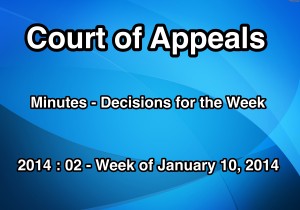 The Court of Appeals announced 28 decisions for the week of January 10, 2014 – numbers 14-41. Five of these decisions were selected “to be published”:
The Court of Appeals announced 28 decisions for the week of January 10, 2014 – numbers 14-41. Five of these decisions were selected “to be published”:
20. Willoughby vs. Commonwealth of Kentucky – criminal case with the COA which involved illegal search and seizure. “Because the trial court’s decision was based on testimony not in the record, on the limited issue of the initial stop, we reverse the denial of the motion to suppress. We, like the trial court, lack sufficient information regarding the reliability of the information upon which the officer relied in stopping Willoughby; therefore, we remand that matter to the trial court for a new evidentiary hearing and findings.”
21 Teague vs. Commonwealth of Kentucky – RCr 11.42. Decision followed Smith v. Commonwealth, 400 S.W.3d 742 (Ky 2013).
22. Hall vs. Commonwealth of Kentucky – addressed postal search and motion to suppress it.
34. Leamon v. Phillips – COA affirmed trial court’s determination that government workers were entitled to absolute or qualified immunity for their roles in reporting suspected child abuse and neglect and/or removing the children.
35. Ohio Cas. Ins. Co. vs. City of Providence, Ky – dealt with purchase of surety bonds for clerks and language of policy pertaining to the extent of coverage.
In addition to No.35 above, there were some other decisions by COA dealing with torts, insurance and procedure issues.
In No. 15, Ohio Ca. Ins. Co. vs. Wellington Place Council of Co-Owners Homeowners Association, the COA affirmed the trial court’s determination that the insurance company was estopped from denying coverage by defending without advising insured of a reservation of rights. Lesson learned here is that counsel retained by an insurance company to defend should be quiet on a reservation of rights issue and not push it. Should they force the issue rather than allow the passage of time to set up an estoppel, would that a. raise a claim of legal negligence; b. conflict of interest; and/or c. result in an estoppel any way since the retained counsel breached his/her fiduciary duty and potentially saved money for the carrier paying his legal bill. This would sorely test the three-legged stool (aka tri-partite relationship) of client-lawyer-insurance company. A discovery can of worms could provide a reason for re-examining this time-honored rule and remember the duties are owed to the insured client and no one else.
In No. 16, Tonia Freeman vs. Becker Law Office, the COA affirmed the trial court’s verdict in a legal malpractice claim that Becker had missed the statute of limitations in a premises liability case at Fort Knox.
Helton v. Jerry’s Discount, Inc. (no. 33) was a premises liability decision involving a plaintiff who slipped and fell at Jerry’s parking lot on an icy buildup caused by waer flowing from what she alledged was a negligently placed drainpipe. The trial court dismissed the claims at summary judgment based upon the “open and obvious” doctrine. After Shelton and the Dicks decisions, it comes as no surprise that a reversal and remanding of these open and obvious cases should be obvious, but what is not so obvious is that this is the second reversal with absolutely no reference to either of these decisions to the Supreme Court’s decision in Wilma Jean Shelton vs. Kentucky Easter Seals Society, Inc., 2011-SC-000554-DG or Dick’s Sporting Goods v. Webb.
[gview file=”http://apps.courts.ky.gov/Appeals/Minutes/MNT01102014.pdf”]

